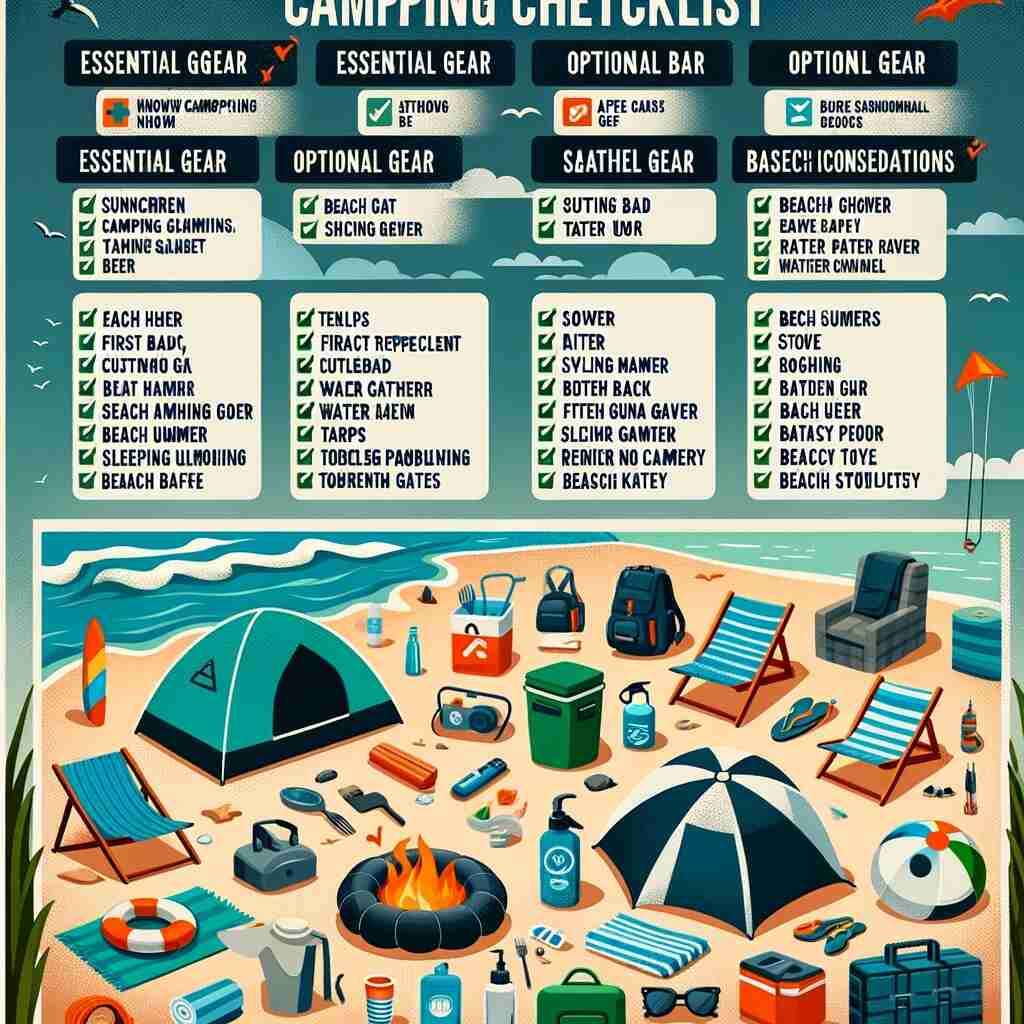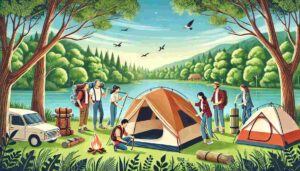Beach camping is a fantastic way to unwind, connect with nature, and enjoy the soothing sound of the waves. However, to make your beach camping trip a success, it’s essential to be well-prepared. This comprehensive beach camping checklist will guide you through everything you need to ensure a safe and enjoyable experience by the sea. From sunscreen to beach kites, we’ve got you covered.

Essential Beach Camping Gear
1. Sunscreen
Sun protection is paramount when spending extended hours under the sun. Opt for a broad-spectrum sunscreen with at least SPF 30 to shield your skin from harmful UV rays. Don’t forget to reapply throughout the day.
2. Towels
Pack both regular and beach towels. Beach towels are larger and designed to withstand sand and saltwater, making them ideal for beach camping.
3. Camping Chairs
Comfortable seating is a must. Choose lightweight, foldable camping chairs that are easy to transport and set up on the sandy shores.
4. First Aid Kit
Accidents can happen anywhere, so a well-stocked first aid kit is crucial. It should contain bandages, antiseptic wipes, pain relievers, and any necessary prescription medications.
5. Insect Repellent
Keep pesky bugs at bay with insect repellent. Look for a formula suitable for your skin type and safe for outdoor use.
6. Tent
A good-quality tent is the foundation of your beach campsite. Make sure it’s durable, easy to assemble, and provides adequate ventilation for those warm beach nights.
7. Beach Camping Tent
Consider investing in a specialized beach camping tent. These tents are designed to handle the unique challenges of beach camping, such as strong winds and blowing sand.
8. Cooler
A cooler will keep your perishable food and beverages fresh. Look for one with good insulation and a secure latch to keep it tightly sealed.
9. Garbage Bags
Leave no trace. Bring plenty of garbage bags to dispose of your trash properly and keep the beach clean.
10. Kitchenware
Your beach camping kitchenware should include pots, pans, utensils, and a portable stove if you plan on cooking. Don’t forget a can opener and a bottle opener.
11. Tarps
Tarps are versatile and can provide extra shade or protect your gear from unexpected rain. They are a valuable addition to your beach camping setup.
12. Water
Hydration is key. Bring an ample supply of water, especially if clean water sources are not readily available at the beach.
13. Beach Blanket
A beach blanket or beach mat is perfect for lounging on the sand. Look for one that is sand-resistant to make cleaning up a breeze.
14. Cutlery
Pack a set of reusable cutlery to minimize waste. Stainless steel or bamboo options are both eco-friendly choices.
15. Lighter or Matches
Fire-starting tools are essential for cooking and staying warm. Store them in a waterproof container to prevent damage.
16. Pillows
A good night’s sleep is crucial. Consider inflatable camping pillows for a comfortable rest.
17. Sleeping Bag
Choose a sleeping bag suitable for the season and weather conditions. Beach nights can get chilly, so opt for a bag with the appropriate insulation.
18. Toilet Paper
Bring toilet paper and a small dustpan for basic hygiene. Some beach camping spots may have restrooms, but it’s best to be prepared.
19. Toiletries
Don’t forget your personal hygiene essentials: toothbrush, toothpaste, soap, and any other toiletries you may need.
20. Beach Umbrella
A beach umbrella provides shade during the hottest parts of the day, allowing you to escape the sun’s intensity.
21. After Sun Care
Sunburn can be a real downer. Include after-sun products like aloe vera gel or lotion to soothe and moisturize your skin if you get too much sun.
22. Stove
If you plan on cooking hot meals at your campsite, a portable camping stove is a must. It’s a convenient way to prepare food without the need for an open fire.
23. Beach Kites
Beach kites are a fun addition to your beach camping experience, especially if you have kids with you. Flying kites over the ocean is a classic beach activity that everyone can enjoy.
Optional Beach Camping Gear
While the items listed above are essential for a successful beach camping trip, there are a few optional items that can enhance your experience:
24. Snorkeling Gear
If the beach you’re camping at offers great snorkeling opportunities, consider bringing your snorkeling gear. Exploring underwater can be a memorable part of your trip.
25. Beach Games
Pack beach games like beach volleyball, paddleball, or a frisbee for some active fun on the shore.
26. Portable Shower
If you prefer to rinse off the salt and sand after a swim, a portable camping shower can come in handy. Some even have solar panels to heat the water.
27. Fishing Gear
If you enjoy fishing, check local regulations and bring your fishing gear. Freshly caught fish can be a delicious addition to your beach camping menu.
28. Beach Toys
If you’re camping with children, bring along buckets, shovels, and other beach toys to keep them entertained.
29. Hammock
A hammock is a luxurious addition for relaxation. There’s nothing quite like swaying in a hammock with the sound of the ocean in the background.
Personal Experience Tips
Here are personal anecdotes and tips from me and other experienced beach campers that can indeed provide valuable insights for your next successful beach camping experience. Here are 6 compiled tips based on information from seasoned campers:
1. Choosing the Right Ground
When setting up a tent on a beach, it’s crucial to select the right spot. You should avoid setting up too close to the waterline to steer clear of high tides or storms. Look for a flat area free from sharp objects or debris. Using a footprint specifically designed for sand is also recommended to protect the bottom of your tent from potential damage.
2. Using the Right Equipment
For beach camping, it’s important to have gear suited for sandy environments. This includes sand-resistant tents with additional ventilation and mesh windows, sand tent stakes with a wider surface area for stability, and guy lines with anchors for windy conditions. You might also consider a footprint to place under your tent for extra protection.
3. Securing the Tent on Sand
Traditional tent pegs are less effective in sand, especially in windy conditions. Using sand-specific tent stakes or anchors is advisable. You can also improvise with items like heavy-duty water bottles or sandbags as makeshift anchors. Securing the tent properly is key to avoid it being blown away by the wind.
4. Keeping Sand Out of the Tent
Completely avoiding sand inside your tent is challenging, but certain practices can help control it. Using a beach towel or a sand-free surf changing mat as a doormat can clean off sand from your feet. Positioning your tent door away from the wind direction can also minimize sand blowing inside when you open it.
5. Temperature and Insect Considerations
Even though the beach might be hot during the day, temperatures can drop at night, and the sand can get cold. Using a sleeping pad for insulation is recommended. Also, be prepared for sand flies or other biting insects by bringing protective clothing or bug spray.
6. Water and Food Safety
Always bring more fresh drinking water than you think you’ll need, as resupplying on the beach is often not an option. When it comes to keeping food safe from seagulls or other animals, ensure that your food is stored in sealed containers and avoid leaving it unattended.
These tips, gathered from various experienced beach campers, can greatly enhance your beach camping experience by ensuring comfort, safety, and preparedness.
Safety and Environmental Considerations
- Know the Rules: Before you head out, familiarize yourself with the beach’s rules and regulations. This includes camping permits, fire regulations, and any restrictions on wildlife interaction.
- Leave No Trace: Practice responsible camping by picking up after yourself and leaving the beach as beautiful as you found it. Dispose of trash properly and avoid damaging natural habitats.
- Weather Awareness: Keep an eye on the weather forecast. Strong winds, high tides, and sudden storms can impact your safety at the beach.
- Water Safety: Always be cautious in the water. Check for rip currents and adhere to any posted swimming advisories. If you’re not a strong swimmer, consider wearing a life jacket.
- Wildlife: Respect the local wildlife and refrain from feeding or approaching animals. Keep your food secure to prevent attracting unwanted critters to your campsite.
- Campfire Safety: If fires are allowed, ensure you follow proper campfire safety protocols. Keep fires small, in designated areas, and fully extinguish them before leaving.
Conclusion
Beach camping is a fantastic way to unwind, connect with nature, and create lasting memories. By following this comprehensive beach camping checklist, you can ensure that you have all the essential gear and optional extras to make your beach camping trip safe, enjoyable, and unforgettable. Remember to stay safe, respect the environment, and leave only footprints in the sand as you embark on your beach camping adventure.
If you need some creativity, here are 60+ ideas for a memorable camping trip!










